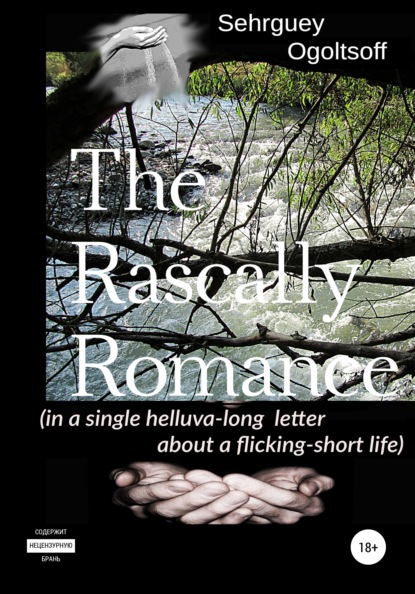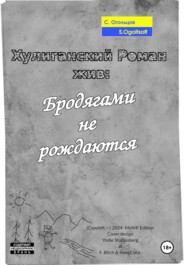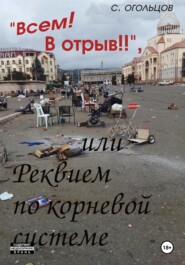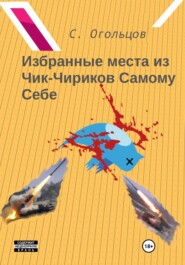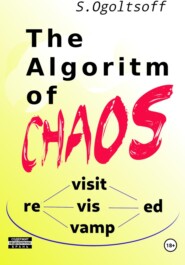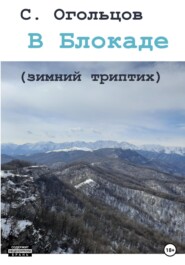По всем вопросам обращайтесь на: info@litportal.ru
(©) 2003-2024.
✖
The Rascally Romance (in a single helluva-long letter about a flicking-short life)
Настройки чтения
Размер шрифта
Высота строк
Поля
Then my escort came out and led me to another building for the hand check. They twirled my thumb, and I hissed like a gander and slapped my other hand against my left side, like a broken wing. From those indications they diagnosed a bone fracture, bandaged the hand, plastered it with gypsum and left me in hospital. Thank you, Alimosha!. Yet, washing the face with one hand was fairly inconvenient…
What could be better than a fracture? No jabs at all, just kick back and wait until the bone tissue grows over. In the dining room, there were square tables for just four persons and chairs instead of benches. The havvage also was much better than in our Canteen. Quite understandable though, because the hospital treated officers as well. Of course, all patients wore pajamas with no insignia, only the wards for officers were on the second floor and those for soldiers in the basement. Who cares if there’s a bed to sleep at any time of day? Besides, the dining room was nearer to us – in the end of the corridor.
The hospital was a quiet place and anything but overcrowded. In my wardroom, apart from me and a Georgian named Rezo, there were four vacant beds. The Rezo's black hair was long enough to be combed back, an obvious mark of a grandpa. He kept his left arm tightly pressed against his chest which attitude resulted from his patronizing help as a driver at wheat harvesting in some steppe kolkhoz. In the field camp, he started fooling around with the cook, and her husband stabbed him in the back with a large kitchen knife, and now the cook kept visiting the sufferer at the hospital. They usually went down the abundant garden, and coming back from there Rezo was offering me yellow plums from the pocket of his pajamas jacket, but I had no appetite although my hand didn't hurt already…
The neighbor wardroom was filled up though. One of the patients there was from our construction battalion, also a grandpa like Rezo only a Russian, named Sanya. Besides, his hair was fair and his right brow missing, licked off with a flat scar. He was a driver too and went AWOL by his tractor and collided somewhere with something, or maybe capsized. They had to amputate both his legs above the knees.
He did not visit the dining room. They buddies from his room were bringing the havvage directly onto his closet-box, although he had crutches and a pair of high leg prostheses next to his bed. On the front cover of The Rural Life magazine, he liked the picture of a shock worker of Communist Labor from Stavropol against the background of her combine harvester and wheat ears, and started writing letters to her. "Hello, unknown Valentina…"
Sometimes his fellow-drivers from our conbat came to visit him. After their closed-door meetings, he screamed songs and quarreled with the on-duty medical personnel. But he got off with it because they would exempt him from the army anyway…
On the second floor, there was a library, sort of, because its two shelves were filled with only translations from Chinese novelists about how socialism was being built in the villages of China. The books were printed in the fifties' before the exposure of the personality cult at the Twentieth Congress of the CPSU. To wit, before Mao Tse-Tung took offense for disparaging his bosom friend Generalissimo Stalin, and in both great powers they stopped singing:
"Moscow – Beijing,
Eternal friendship…"
And what would you do when left with no choice? You’d go and read social realism masterpieces in the best tradition of the newspaper Renmin Ribao…
A commotion broke up in the next wardroom, splashing out into the corridor – the combine driver Valentina answered Sanya's letters by her live visit. She got seated in the yard, on a bench under a tree. A swarthy-faced woman of Moldovian type, beautiful as movie stars from the first Soviet color flicks about collective farms in the Cossack villages. The most handsome buddy-patient from the neighbor wardroom alighted by her side with explanations that Sanya would presently come from a medical procedure.
And Sanya, in hysterical jitters, was sitting on his bed in the ward, fastening his prostheses. They helped to pull his pajama pants over them, and, sticking two crutches in his armpits, he clumsily dragged his body to the exit door. But Valentina—well done!—for whole 3 minutes she sat next to him on the bench that he finally reached. Then the same handsome buddy led her along the shortcut path to the unofficial exit thru a hole in the fence…
Two days later along the same path…I watched and I couldn't get it… It just couldn't be! But who else was that if not Olga?!. Yes, it's she!.
The same evening, I went with her to the park in her trousers and some sort of a turtleneck while she, sure thing, had her mini skirt on.
On the dance-floor, a pack of local yobbos started to close in, probably, attracted by the pattern of huge yellow flowers all over my borrowed pants. A couple of dippers on AWOL from our conbat had identified me and approached. One of them rigged out with a civilian citizenka and the second was in a "Pe-Sha" outfit, I didn't even know their names. The locals got it that the construction battalion was having a pleasure-walk and dissolved…
Olga had a whole heap of news in her life. She had again moved to Theodosia, but in the day nursery there were no places for babies. So she took Lenochka and went to the city executive committee on the chairman's reception day.
He parroted the same thing – there were no places and that's it. Then she just put Lenochka on his desk and walked out, he ran after her to the stairs, "Citizen! Take your baby!" In short, they found a place.
Her mother was looking after Lenochka, while she went to Stavropol, only on the train they stole all her money. And my wedding ring was also gone. But it happened still back in Konotop. She was wearing it on her finger though it was too wide and when washing she did not notice that it slipped off into the basin, and she splashed it away with the soapy water into the drain pit…
The next day she borrowed money for her back travel from the cook, who came to visit Rezo, and walked away down the same shortcut path…
They took the plaster off my hand and discharged me. By free of charge trolleys I traveled to the south-eastern outskirts of Stavropol and from the ring road there walked on under the tall roadside trees bordering the highway to Elista, towards the Demino fork.
Bright yellow leaves scattered the ground here and there, the sun was shining, yet it felt like it was autumn already. But when was the summer?
One of the conbat trucks pulled up on the highway. The driver shouted to me, "Home?"
I said, yes, home, and jumped into the truck bed. Because neither from work, nor from AWOL's we never returned "to the detachment", or "to the barracks". We were coming back “home”…
~ ~ ~
At home, it wasn't without news too. During my absence, our squad lived thru a rampage of torturing humiliation at the hands of grandpas who drove them after the lights-out out the barrack to the drill grounds and they had to walk "goose step" in a circle before getting beaten.
Karlookha from Second Company was particularly atrocious – he liked to jab a young with the knife, not so as to stab but aggravate by pricking. And he himself was just a dwarf, half-head lower than normal human height. Then in the basement of the 50-apartment block, he rushed with his knife on Sehrguey Chernenko, handled Gray, from Dnepropetrovsk. But Gray had his Zona skills for such incidents and knocked him out. Karlookha thief-swaggered only on the grounds of being a grandpa, but those grandpas from his draft, who had done their time before the army, hadn't supported him against Gray. So everything, like, subsided but the tension held on.
On the wave of that suspended tension, some pheasant clung to me, "Are you from thieves?"
Answering such a question in affirmative, you had to make it clear which stretch the prosecutor demanded for you and what was the final verdict, but for me the articles of the Penal Code were as closed a book as formulas from Organic Chemistry. Saying "yes' without having done some time, you became an impostor from the view-point of Zona code, liable to hard consequences.
So I said "no" and he took me to the Leninist Room and began to shear my hair in a "zero-like" style with a hand-held machine – the length of my hair was a crying impudence for a young. I did not mind though, it had 2 years ahead to grow back. However, the machine was blunt and a couple of times it pulled very painfully.
There was a plasterer from Third Company in the Leninist Room, who came to see his Armenian buddies-countrymen. So, he suggested the home-made barber letting him finish my haircut. The pheasant himself was not already happy that he started that job, and yielded the machine to him.
In short, Robert Zakarian did my haircut, and when the machine jammed he said, "I am sorry". I had completely forgotten there were such words in existence…
Later, Robert started visiting the Club and became a vocalist at The Orion. He had the purest Russian pronunciation because he grew up in the Far North where his father served his time in a camp, convicted of dissidence or something of the sort. When the old man was paroled to "chemistry" in the same region, Robert's mother moved there too, taking Robert and his younger brother north, far away from Armenia.
With his stretch completed, Robert's father applied for emigration of his family from the Soviet Union. Two years passed, and he passed away before they gave permission.
There remained some time before the fixed date of their departure, and Robert went to spend it by his Armenian relatives in the seaside city of Sochi. There he met a Russian girl Valya from the Tula city and fell in love. They exchanged their addresses and, on his return to the north, Robert bleared out that he refused to leave the Soviet Union.
Yet, the papers were drawn up already for the whole family and, without him, his mother and brother would not be let out. The brother tried to make him understand the situation by fighting him, yet Robert daringly maintained his intentions to keep true his promises to his dear beloved. Then the mother began crying on a daily basis and, eventually, he landed with them in Paris by their Armenian relatives because of whose invitation they were let out.
In Paris, he found a job at a construction site. He did not know the language, he had no friends, and all his dreams were only of Valya from Tula…
A year later, with a tourist group from France, Robert Zakarian came to Moscow, and the very first night, he slipped out the hotel which his group was accommodated at and scurried to the Tula city. For 10 days he lived there in the house of Valya's parents before her mother persuaded him to give himself up to the authorities.
When he turned up in the Tula KGB, the officers there were simply delighted because their bosses in Moscow were all horns and rattles about the disappearance of a tourist from Paris. He was immediately taken to the airport and deported to France.
In Paris, he requested the Soviet Embassy to let him back to the USSR, to his beloved. And then he kept visiting them every week, and the embassy clerk, with a tattoo "Tolik" on his hand, was shaking his head and saying there was no answer to his appeal… It took Tolik about a year to nod, at last, instead of shaking because there had come a positive response.
Robert arrived in Tula, married Valya, they had a baby daughter, and he was drafted to our construction battalion. He liked to show a black-and-white photograph of his family: he himself on the left, black-haired, with a serious look in the wide-set eyes below the broad black eyebrows of an unquestionably family man; his wife Valya, on the right, in a white blouse and fair curls about her round face; the baby-daughter, in between the two, in a fancy cap of fine lace. So, the contingent of our construction battalion comprised not only cripples and jail-birds, we even had a double migrant in our ranks…
On the Seventh of November, The Orion gave their first concert on the VSO-11 Club stage. The drums were knocked and kicked at by Vladimir Karpeshin, handled Karpesha. Vladimir Rassolov and Robert Zakarian provided lead vocals. Alexander Roodko sang along with them and played the bass guitar; I kept silent and played the rhythm guitar.
In our vocal-instrumental ensemble, there also was a horn player, Kolya Komissarenko, handled Commissar, a short, dark-haired guy from Dnepropetrovsk of a cheerfully Jewish appearance. He played very diligently, yet did no better than I in my singing. Every crap note by the horn obviously tormented Roodko who still and all kept putting up with it. Probably, the presence of a horn player on stage tickled his nostalgia for his Philharmonic past. To hear less clam, he time and again cut the horn part shorter and shorter…
For the concert, we changed into parade-crap (three of us into that from strangers because a conbatist got his parade-crap only after 1 year of service). The first number in the concert was "The Wide, Wide Field" song (sort of a patriotic one). Roodko dreamed of making it with a four-part vocal harmony like that by The Pesnyary, but because of the limited range of the vocalists' sound and the crappy clams from the Commissar's horn (at which he goggled his beady eyes out in outright amazement but still blew on) this philharmonic piece of shit was almost booed at.
However, Robert Zakarian got a warm applause for his number (sort of a lyrical one). He performed the adaptation of the French song, the air of which was year after year used by the Central Television News Program "Time" when announcing the weather forecast.
"Yes, I can forgive you all
And let to the sky like a bird free of thrall…"
The servicemen of Caucasian nationalities (mostly from Separate Company) enthusiastically met the song "Eminnah" performed by Vladimir Rassolov (sort of an Eastern-comical one).
"Under the burka of your girlfriend
There's no girlfriend but your Granddaddy.
Uh, Eminnah!.."
And the song "The Rains" from the repertoire of Fofik (The Orpheuses at DK KEMZ, Konotop) was awarded a unanimous ovation (sort of the hit of season).
However, in the oral review delivered by Battalion Zampolit, aka the Political Deputy Commander of VSO-11, after the concert in the close circle of the musicians, the final song received the lowest rating. "Roodko, those fucking "Rains" of yours have already drenched everyone fucking thru and thru."





